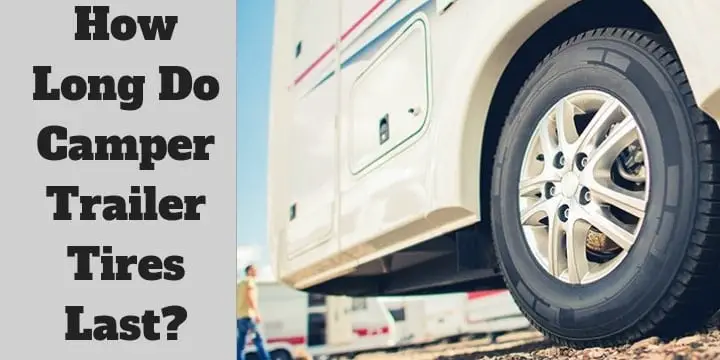How Long Do Camper Trailer Tires Last?
The lifespan of camper trailer tires can vary depending on several factors, including the quality of the tire, the amount of weight carried by the tire, the driving conditions, and how well the tire is maintained. In general, camper trailer tires can last anywhere from three to six years, although some tires may last longer.
It is important to regularly inspect your camper trailer tires for signs of wear and tear, such as cracks in the sidewalls, bulges, or uneven tread wear. It is also recommended to have your tires inspected by a professional at least once a year.
To extend the lifespan of your camper trailer tires, it is important to properly maintain them. This includes maintaining the correct tire pressure, rotating the tires regularly, and storing them properly when not in use. It is also important to avoid overloading your camper trailer, as this can cause excessive wear and tear on the tires and shorten their lifespan.
If your camper trailer tires are more than six years old or show signs of significant wear and tear, it is recommended to replace them to ensure optimal safety and performance on the road.
What Leads to Deterioration of Tires?
There are several factors that can lead to the deterioration of tires:
- Age: Even if a tire is not being used, it can still deteriorate over time due to exposure to heat and sunlight, leading to cracking and loss of elasticity.
- Overloading: Exceeding the recommended weight capacity of a tire can cause excessive wear and tear, leading to deterioration and possible failure.
- Underinflation or overinflation: Driving on underinflated or overinflated tires can cause uneven wear and tear, leading to deterioration and possible failure.
- Poor road conditions: Driving on rough or uneven roads, potholes, or debris can cause damage to the tires, leading to deterioration over time.
- Exposure to extreme temperatures: Exposure to extreme heat or cold can cause the rubber in the tires to break down, leading to deterioration.
- Improper storage: Tires that are stored improperly, such as being exposed to sunlight or moisture, can deteriorate over time.
- Chemical exposure: Exposure to certain chemicals, such as oil or gasoline, can cause damage to the rubber in the tires, leading to deterioration.
It is important to regularly inspect your tires for signs of deterioration, such as cracking, bulging, or uneven wear and tear. Proper maintenance, including maintaining the correct tire pressure, rotating the tires regularly, and storing them properly, can also help prevent tire deterioration.
Video Overview: Tire Wear Problems – Causes and Symptoms
What Effect Does Mileage Have on Camper Trailer Tires?
Mileage can have a significant effect on the lifespan and condition of camper trailer tires. The more miles you put on your camper trailer tires, the more wear and tear they will experience, which can lead to deterioration and potential tire failure.
When driving a camper trailer, it is important to remember that the weight of the trailer is distributed across the tires, which can cause increased wear on the tires compared to a vehicle without a trailer. Additionally, if the trailer is overloaded, this can cause even more wear and tear on the tires.
Regularly inspecting the tires for signs of wear and tear, such as uneven tread wear or cracks in the sidewalls, is important to ensure that they are still safe for use. It is also recommended to have the tires inspected by a professional at least once a year, regardless of the number of miles driven.
Proper maintenance, such as maintaining the correct tire pressure, rotating the tires regularly, and storing them properly when not in use, can help extend the lifespan of camper trailer tires and reduce the impact of mileage on their condition. Additionally, avoiding overloading the trailer and driving at excessive speeds can also help reduce wear and tear on the tires.
>> You may also like: Worst 5th Wheel Brands to Avoid <<
How Can Aging Be Decreased in Tires?
While tire aging is inevitable, there are steps you can take to slow down the process and extend the lifespan of your tires:
- Store your tires properly: When not in use, tires should be stored in a cool, dry, and dark place away from direct sunlight and sources of heat. Tires should be stored away from chemicals, solvents, and fuels that can cause damage to the rubber.
- Maintain the correct tire pressure: Maintaining the recommended tire pressure for your vehicle can help prevent excessive wear and tear on the tires, which can speed up the aging process.
- Rotate your tires regularly: Regularly rotating your tires can help distribute the wear and tear more evenly across the tires, which can help extend their lifespan.
- Inspect your tires regularly: Regularly inspecting your tires for signs of wear and tear, such as cracks, bulges, or uneven tread wear, can help identify issues before they become more serious.
- Avoid overloading your vehicle: Overloading your vehicle can cause excessive wear and tear on your tires, which can speed up the aging process. Be sure to follow the recommended weight limits for your vehicle.
- Replace your tires when necessary: If your tires are showing signs of significant wear and tear, or if they are more than six years old, it is recommended to replace them to ensure optimal safety and performance on the road.
By following these tips, you can help decrease the aging process in your tires and extend their lifespan.
Video Overview: How old are my tires? // How to check tire age
How To Do Proper Inflation?
If you want to use your camper tire for longer then make sure you know the proper inflation of your tire. as people sometimes think that giving maximum pressure when pumping will be good for it. But it is a complete misunderstanding between the customer and the engineer.
It actually meant that the maximum pressure it can take is the amount that is written. so if you give maximum air pressure when you will drive in hot or at a high speed the increased temperature inside will expand the tire’s air and it will result in an explosion. So don’t fill it with the maximum amount. always keep 2 to 3 PSI gap.
Video Overview: RV Tire Inflation Tips
How to find the Proper Tire For Camper Trailers?
You have to keep a lot of things in mind when you are buying tires for your Camper trailer.
- There are many tires out there and each of them has different parameters. So before buying make sure what kind of location you like to travel to the most. and buy tires that feel this requirement.
- If you are carrying heavy loads with you then try to buy bigger tires. It will last two times longer than the smaller one.
- Before buying Tires keep in mind your engine mileage. If you have higher mileage then buy tires with good and strong rubbers.
Video Overview: What is the Correct Way to Determine the Proper PSI for RV Tires?
How Do I Find the Correct Weight Load for My Tires?
The best way to find The correct weight load for your Camper tire is by checking if index. every tire has a number written on it. it is called the tire index. By matching the number with the index you can find approximately how much weight your tire can take. that doesn’t mean that your tire is able to carry more. but if you carry more than the given value, it will last only 1 to 2 years. so make sure you check the index before buying or traveling.
Video Overview: How To Read Tire Sizes | Truck Accessories Explained
Should I Use Radial or Bias Tires?
The choice between radial and bias tires depends on several factors, including the type of vehicle, the driving conditions, and the desired performance characteristics.
Radial tires have the advantage of offering better fuel efficiency, longer tread life, and a smoother ride. They are also better suited for high-speed driving, as they generate less heat and have a lower rolling resistance.
Bias tires, on the other hand, are more durable and offer better traction in off-road or extreme weather conditions. They also tend to be less expensive than radial tires.
In general, if you drive primarily on paved roads and want a smoother, more fuel-efficient ride, radial tires are a better choice. If you frequently drive on unpaved or rough terrain and need more durability and traction, bias tires may be a better option.
Ultimately, the best choice between radial and bias tires will depend on your specific needs and preferences, as well as the recommendations of your vehicle manufacturer. It is important to choose a tire that is compatible with your vehicle and suited for your driving conditions to ensure optimal performance and safety.
Video Overview: Bias vs Radial Tires
The Bottom Line
So wait no more and buy what tires you need for your campfire and enjoy your moments with your friends and family.
>> You may also like:45 RV Accessory Must-Haves for Your Travel Trailer<<


![Buying a Used RV: Everything You Need to Know. [Updated for 2023] Buying a Used RV: Everything You Need to Know. [Updated for 2023]](https://cdn-0.campertrailerreport.com/wp-content/uploads/2018/02/Buying-a-Used-RV-720x360.jpg)
